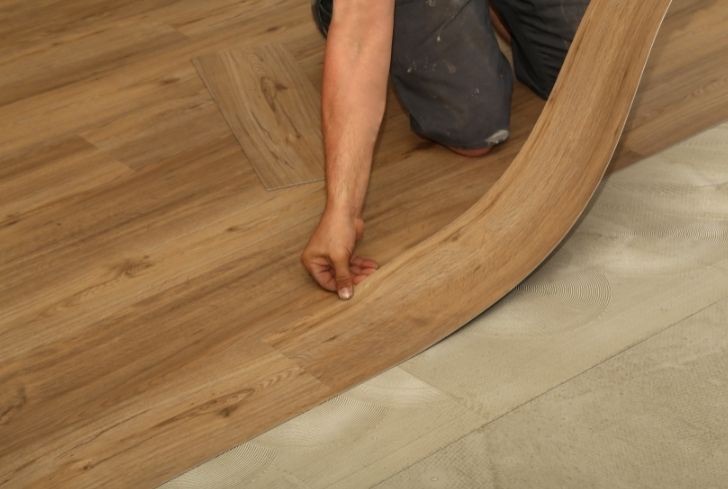
If you're looking for an affordable alternative to stone or hardwood flooring, vinyl flooring is a popular option, particularly for institutional and commercial spaces.
Vinyl flooring offers a high level of customization and design flexibility.
It is made from materials like plastic, fiberglass, and PVC, forming a multi-layered product. Like any flooring option, vinyl flooring has its pros and cons, which we'll explore in this article.

Why Choose Vinyl Flooring?
Floors are a key part of home décor. Whether you notice it or not, anyone entering your home will first observe the floor. It’s essential to have a beautiful floor that is durable, long-lasting, and cost-effective. If you want to transform your home or commercial area into a stunning space, vinyl tiles are definitely worth considering.

Advantages of Vinyl Flooring
-
Durability: Vinyl floors are highly durable and can handle heavy foot traffic for extended periods without damage. This makes them ideal for commercial spaces and institutions. A well-installed vinyl floor can last for up to 20 years.
-
Cost-Effective: Despite its durability, vinyl flooring is relatively inexpensive, making it a great alternative to traditional flooring options like hardwood, stone, or even concrete. Vinyl is much cheaper due to the materials used.
-
Low Maintenance: Vinyl floors are incredibly easy to maintain. They are resistant to impact and abrasion and can be easily cleaned using mechanical buffing equipment and chemical strippers.
-
Easy Installation: Vinyl flooring is easy to install, making it an excellent DIY project. Some people have successfully installed vinyl floors themselves in just minutes. Vinyl can also be installed over existing floors like linoleum or even older vinyl, making the existing floor act as a subfloor.
-
Water-Resistant: Vinyl floors are water-resistant, making them perfect for kitchens and other areas where spills are common. Thanks to its water resistance, vinyl flooring is easier to clean compared to conventional tiles.
-
High Friction Factor: Vinyl floors provide good grip, reducing the risk of slipping and falling. They also have high hardness, allowing them to withstand heavy weights.
-
Cushion Effect: Vinyl floors are soft and spongy, which can cushion falls and prevent breakage of items like plates or glasses.
-
Variety of Styles: Vinyl flooring comes in a wide range of designs, mimicking the appearance of materials like wood, concrete, stone, and terrazzo. The difference between real materials and vinyl is often only noticeable upon close inspection.

Disadvantages of Vinyl Flooring
-
Prone to Damage: While vinyl flooring’s spongy quality is helpful, it can also be easily gouged or scratched by sharp objects or moving furniture. However, using furniture pads can help prevent these issues.
-
Not Ideal for Bathrooms: Although vinyl is water-resistant, it is not fully waterproof. It cannot withstand being submerged in water for extended periods, which can cause it to peel. Therefore, it is not recommended for bathrooms or toilets.
-
Vinyl Over Vinyl is Not Ideal: Installing vinyl over an existing vinyl floor is not recommended. Vinyl floors require a perfectly smooth surface, or imperfections from the previous floor will show through over time.
-
Subfloor Preparation: While installing vinyl is easy, preparing the subfloor can be more challenging. The subfloor must be clean and free of debris to prevent bumps and lumps from showing up on the vinyl surface. If the subfloor is dirty, peel-and-stick vinyl tiles may come loose more quickly.
Conclusion
Vinyl flooring is a great option if you’re looking for a durable, water-resistant, and affordable floor that is easy to install and maintain. However, vinyl flooring is not the most eco-friendly option and may not be the most visually appealing or longest-lasting compared to other materials like hardwood or stone. If these factors are important to you, you might want to explore other flooring options.


















 US 16571
US 16571  GB 12743
GB 12743  CA 9454
CA 9454  AU 6390
AU 6390  IE 2659
IE 2659  IN 1249
IN 1249  RU 885
RU 885  SG 854
SG 854 

